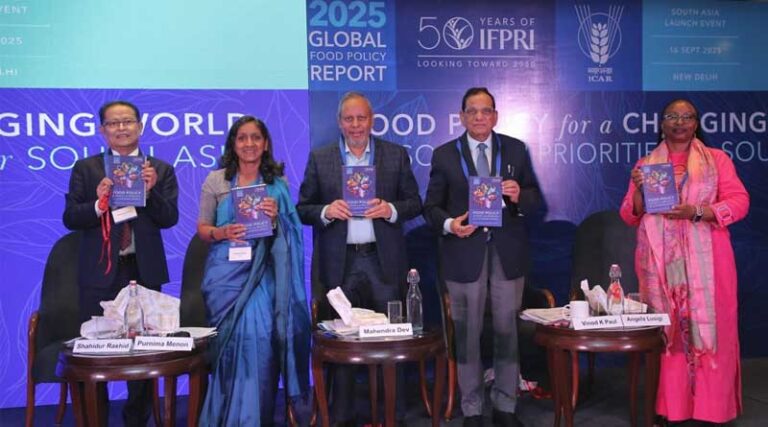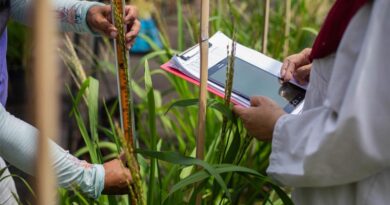
IFPRI and ICAR Convene South Asia Dialogue on Food Policy to Spotlight Priorities for Resilient, Healthy, and Inclusive Food Systems
19 September 2025, New Delhi: Food systems lie at the heart of sustainable development. They influence how people produce, access, and consume food and are intricately tied to livelihoods, public health, natural ecosystems, and economic growth. For South Asia, where a large share of the population remains dependent on agriculture and food-related services, strengthening food systems is both a developmental and strategic priority.
Against this backdrop, the International Food Policy Research Institute (IFPRI), in partnership with the Indian Council of Agricultural Research (ICAR), convened a high-level regional policy dialogue, “Food Policy for a Changing World: Lessons and Priorities for South Asia”, on September 16, 2025, in New Delhi. The event also marked the South Asia launch of IFPRI’s 2025 Global Food Policy Report (GFPR).
Building stronger linkages
The dialogue brought together senior policymakers, researchers, and development partners to reflect on how South Asia can secure resilient, inclusive, and sustainable food systems amid mounting pressures of climate change, malnutrition, and demographic transitions.
The chief guest, Prof. S. Mahendra Dev, Chairman, Economic Advisory Council to the Prime Minister of India (EAC-PM), reminded participants that the food systems agenda cannot lose sight of traditional priorities: “While we are focusing on newer challenges like food systems, environment, and nutrition, we should not forget that earlier priorities like agriculture growth linkages and rural investments remain critical. Governments and the private sector must work together to reshape food systems that deliver affordable, healthy, and diversified diets.”
Nutrition was another central theme. Dr. Vinod K. Paul, Member, NITI Aayog, emphasized early interventions: “If we truly want to break the intergenerational cycle of malnutrition, we must act before pregnancy. Preconception health and nutrition for women can reduce growth restriction by up to 25%, and when coupled with later interventions, can cut childhood stunting by nearly half.”
State-level and regional action
State innovations also featured prominently. Smt. Anu Garg, Development Commissioner – cum – Additional Chief Secretary, Government of Odisha, reflected on her state’s progress: “Odisha’s journey from districts once infamous for starvation deaths to becoming the fifth-largest rice producer in India shows what determined institution-building and investment in irrigation can achieve. Today, our focus is on embedding climate resilience into agriculture so that this progress endures.”
Continuing this theme, Dr. Arabinda Kumar Padhee, Principal Secretary, Department of Agriculture and Farmers’ Empowerment, Government of Odisha, highlighted Odisha’s integrated approach: “Odisha is perhaps one of the few states where we have both a climate resilience cell and we are going to have a Gender Responsive Cell. Through CRC and GRC we wanted to build into our design the gender and climate lens from the beginning.” He also noted that regional cooperation initiatives, such as Seeds Without Borders, demonstrate how cross-country collaboration can accelerate the spread of climate-resilient varieties.
Adding a national perspective, Smt. Arti Ahuja, Former Secretary, Government of India, urged participants to think beyond narrow definitions of agriculture: “We often forget the associations behind what’s on our plate – who grows it, who waters it, who brings it to our table. Our mental models of agriculture reduce it to just crops, ignoring livestock, storage, processing, and even the role of women farmers who remain invisible in our imagination. Transforming food systems requires more than isolated initiatives, it calls for an all-of-government and all-of-society effort, bringing together diverse actors around a shared vision.”
Climate, inclusion, and transformation
The broader environmental dimension was brought into focus by Dr. Angela Lusigi, India Representative, United Nations Development Programme (UNDP), who observed: “The challenges we face are not merely about numbers or statistics. It’s about justice and equity as a fundamental right to food security. Climate vulnerability is deeply intersectional – it intersects poverty, gender, geography, and social status.” She called for inclusive and integrated solutions that combine innovation with traditional knowledge.
Dr. Purnima Menon, Senior Director, Food and Nutrition Policy and Acting Director, Transformation Strategies, IFPRI, reinforced IFPRI’s role as a global connector of policy evidence: “At IFPRI we really do believe in the transformational power of policy – whether sub-national, national, or regional. We see our role as connecting the dots across regions, from South Asia to Africa, so that lessons here can inform solutions globally.”
A timely moment for South Asia
Summing up the stakes for the region, Dr. Shahidur Rashid, Director, IFPRI-South Asia, noted: “This year’s Global Food Policy Report is special – it not only marks IFPRI’s 50-year journey, but also reflects on the future policy challenges that will shape food and agriculture in the decades ahead. For South Asia, the report highlights three stubborn challenges that demand urgent attention: climate change, persistent undernutrition, and the need for healthier, more diverse diets.”
Looking ahead
As South Asian countries strive to achieve the Sustainable Development Goals by 2030 and envision resilient, inclusive, and sustainable food systems by 2050, the urgency for coordinated, evidence-based policy action has never been greater.
The South Asia Dialogue, co-hosted by IFPRI and ICAR, underscored the region’s shared responsibility and opportunity to lead. Anchored in evidence, enriched by experience, and committed to collaborative solutions, the discussions set the stage for food systems transformation that prioritizes resilience, equity, and nutrition for all.
Also Read: Escorts Kubota Introduces New Combine Harvester in North India
📢 If You’re in Agriculture, Make Sure the Right People Hear Your Story.
From product launches to strategic announcements, Global Agriculture offers unmatched visibility across international agri-business markets. Connect with us at pr@global-agriculture.com to explore editorial and advertising opportunities that reach the right audience, worldwide.






